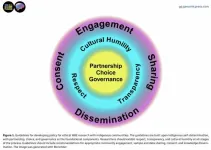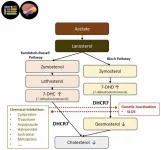(Press-News.org) Statement Highlights:
It is essential for health care professionals to routinely screen pregnant and postpartum women for depression and anxiety, address modifiable risk factors and consider behavioral and pharmacological interventions to improve long-term maternal health outcomes.
Multidisciplinary care teams, including psychologists and other behavioral health professionals, are important to monitor and provide appropriate mental health support during pregnancy and after birth.
The new scientific statement is featured in a special Go Red for Women® issue of the Journal of the American Heart Association, publishing on February 25, 2025, in recognition of American Heart Month 2025.
Embargoed until 4:00 a.m. CT / 5:00 a.m. ET Tuesday, Feb. 25, 2025
DALLAS, Feb. 25, 2025 — Integrating routine psychological health screening and treatment during and after pregnancy may reduce the risk of adverse pregnancy outcomes and improve maternal cardiovascular health, according to a new scientific statement published today in a Go Red for Women® spotlight issue of the Journal of the American Heart Association, an open access, peer-reviewed journal of the American Heart Association. This spotlight issue focuses on research about sex differences in cardiovascular disease and their implications for care.
The new scientific statement, “Optimizing Psychological Health Across the Perinatal Period: An Update on Maternal Cardiovascular Health,” highlights the need to support maternal cardiovascular health by including comprehensive screening of psychological health during the perinatal period (pregnancy through one year postpartum). Cardiovascular issues are the No. 1 cause of maternal death. The new statement summarizes the evidence associating psychological health concerns and adverse cardiovascular outcomes; highlights effective management strategies and integrated care delivery models; and identifies current challenges and future directions for improving maternal health outcomes.
“It’s critical that we redefine maternal cardiovascular health to include psychological health because there is robust evidence on the association of psychological health with cardiovascular outcomes,” said writing group Chair Garima Sharma, M.D., FAHA, director of preventive cardiology and women’s cardiovascular health at Inova Schar Heart and Vascular in Fairfax, Virginia. “We also recognize the importance of providing guidance to clinicians on how to integrate psychological health screening into the perinatal period and focus on providing a holistic approach with the mind and heart interconnection.”
Maternal Psychological and Cardiovascular Health Linked
The maternal mortality rate in the United States is two to three times higher than estimates from other high-income countries and has worsened since the COVID-19 pandemic, with significant disparities among people in underrepresented races and ethnicities. The mortality rate for non-Hispanic Black birthing women is 2.6 times higher than for non-Hispanic white women.
Perinatal psychological health conditions such as depression and anxiety are among the leading causes of maternal mortality in the U.S. and are associated with adverse pregnancy outcomes and long-term cardiovascular outcomes. Psychological health, often used interchangeably with mental health, encompasses emotional, social and functional well-being and is affected by factors such as living conditions, traumatic events and daily stressors.
An estimated 52% of women of reproductive age report having a history of a psychological health condition, and 40% of those from underrepresented races and ethnicities experience anxiety or depression in the perinatal period.
People with suboptimal mental health may engage in negative health behaviors (such as poor diet, irregular sleep, low physical activity, tobacco, alcohol and/or illicit substance use and/or difficulty adhering to medical recommendations), which can negatively affect their cardiovascular health. Maternal psychological health can also affect the child’s neurodevelopment and well-being.
Screening for Risk Factors for Psychological Health
“Pregnancy is an important time of life from a health perspective. However, it is not known how many health care professionals understand the connection between the mind and heart and routinely screen and optimize psychological health during the perinatal period. Screening for psychological health before, during and after pregnancy should be used alongside screening for high blood pressure, Type 2 diabetes and other modifiable risk factors for cardiovascular disease,” said Sharma.
Risk factors for psychological concerns include domestic violence, sleep disorders, personal or family history of psychological conditions, incarceration, active-duty military service, Veteran status, lack of partner support, unemployment, and racism and discrimination. Adverse outcomes in prior pregnancies, including miscarriage, ectopic pregnancy and high blood pressure during pregnancy, are also risk factors for perinatal anxiety and depression.
Incorporating regular psychological health screening into perinatal care involves training health care professionals to use screening tools effectively and establishing protocols for follow-up care, including comprehensive assessment and appropriate interventions. For example, the Patient Health Questionnaire (PHQ-9) can be used by health care professionals to screen for symptoms of depression and anxiety. This universal screening tool has been effective at increasing awareness of and decreasing stigma associated with psychological health challenges.
Initial prenatal mental health screening should take place as early as practical in pregnancy and should be repeated at least once. During the initial obstetric visit, it is essential to review the patient’s psychological history and use of psychopharmacotherapies or other treatments to identify risk factors for mental health conditions.
“During pregnancy and postpartum, identifying and intervening on modifiable risk factors that increase the risk of depression, such as social isolation, no or inadequate partner support, depression before pregnancy and poor sleep quality, may improve maternal psychological health as well as future cardiovascular health,” Sharma said.
Since psychological symptoms may fluctuate over time, inquiring about emotional well-being (and the well-being of their partner, if appropriate) should ideally be part of every prenatal or postpartum visit.
Considerations for Managing Maternal Psychological Health
Whatever the setting and circumstances, perinatal psychological care should be culturally responsive, language-appropriate and family-centered. It should involve shared decision-making with the patient (and their significant other(s), if the patient agrees), including a full discussion of the potential risks and benefits of any treatments offered to the mother and the fetus or newborn.
When considering pharmacologic treatment for depression or anxiety, the choice of medication should be based on efficacy in pregnancy, safety in pregnancy, safety during breastfeeding (if applicable) and consideration of interactions with other medications.
As medications carry potential side effects to both mother and child, there is significant interest in non-pharmacological strategies to both prevent and treat depression and anxiety symptoms during and after pregnancy. Counseling, cognitive behavioral therapies, exercise, stress management strategies and other treatment methods may be preferred.
Health professionals providing care, such as psychologists, clinical social workers, psychiatrists, general internal medicine specialists and obstetricians, should work as a team and have appropriate training and skills and work collaboratively to provide continuity of care for patients and their families during pregnancy and postpartum.
Opportunities for Improvement and Future Research Needs
Barriers to integrating perinatal psychological health care into cardiovascular health care exist at individual, health system, community level and government and policy levels along the perinatal care continuum. Known barriers to addressing perinatal mental health concerns include stigma, fears of Child Protective Services removing the child, clinician time constraints, clinician inexperience, workforce issues and reimbursement related concerns.
There is a need to create health care delivery models to incentivize health systems and clinicians to adopt evidence-based, accessible models of care focused on awareness, screening and optimization of psychological health with partnerships with community-based organizations. Initiatives that could potentially improve outcomes and reduce racial and socioeconomically-mediated inequities include expanding reimbursement for doulas, midwives and community health workers.
Additionally, there is a critical need for long-term research on perinatal psychological health because it influences cardiovascular health and other chronic disease outcomes across the individual’s lifespan. Considering the known disparities in maternal health based on race, ethnicity and social drivers of health, more people of underrepresented races and ethnicities need to be included in studies on maternal psychological and cardiovascular health. Increased research is also needed related to other psychological factors besides depression, such as anxiety, adverse childhood experiences, post-traumatic stress disorder and psychosocial stressors that disproportionately or differentially affect women.
This scientific statement was prepared by the volunteer writing group on behalf of the American Heart Association’s Cardiovascular Disease & Stroke in Women and Underrepresented Populations Committee of the Council on Clinical Cardiology; the Council on Cardiovascular and Stroke Nursing; the Council on Cardiovascular Radiology and Intervention; the Council on Cardiovascular Surgery and Anesthesia; the Council on Lifelong Congenital Heart
Disease and Heart Health in the Young; the Council on Lifestyle and Cardiometabolic Health; the Council on Quality of Care and Outcomes Research; and the Stroke Council.
American Heart Association scientific statements promote greater awareness about cardiovascular diseases and stroke issues and help facilitate informed health care decisions. Scientific statements outline what is currently known about a topic and what areas need additional research. While scientific statements inform the development of guidelines, they do not make treatment recommendations. American Heart Association guidelines provide the Association’s official clinical practice recommendations.
Co-authors are Vice-Chair Glenn N. Levine M.D., FAHA; Allison E. Gaffey, Ph.D., FAHA; Afshan Hameed, M.D.; Nadine A. Kasparian, Ph.D.; Rina Mauricio, M.D.; Elisabeth Breese Marsh, M.D., FAHA; Dana Beck, Ph.D., M.S., M.S.N.; Jenna Skowronski, M.D.; and Diana Wolfe, M.D. Authors’ disclosures are listed in the manuscript.
The Association receives funding primarily from individuals. Foundations and corporations (including pharmaceutical, device manufacturers and other companies) also make donations and fund specific Association programs and events. The Association has strict policies to prevent these relationships from influencing the science content. Revenues from pharmaceutical and biotech companies, device manufacturers and health insurance providers, and the Association’s overall financial information are available here.
Additional Resources:
Available multimedia is on right column of release link
Spanish news release
After Feb. 25, 2025, view the manuscript online.
AHA news release: Socioeconomic status during early pregnancy may play a large role in future heart health (Nov. 2024)
AHA scientific statement: Opportunities in the Postpartum Period to Reduce Cardiovascular Disease Risk After Adverse Pregnancy Outcomes: A Scientific Statement From the American Heart Association (Feb. 2024)
AHA news release: Prenatal depression may be linked to cardiovascular disease after childbirth (April 2023)
AHA health information: Pregnancy and Maternal Health
Follow AHA/ASA news on X @HeartNews
Follow news from the Journal of the American Heart Association @JAHA_AHA
###
About the American Heart Association
The American Heart Association is a relentless force for a world of longer, healthier lives. Dedicated to ensuring equitable health in all communities, the organization has been a leading source of health information for more than one hundred years. Supported by more than 35 million volunteers globally, we fund groundbreaking research, advocate for the public’s health, and provide critical resources to save and improve lives affected by cardiovascular disease and stroke. By driving breakthroughs and implementing proven solutions in science, policy, and care, we work tirelessly to advance health and transform lives every day. Connect with us on heart.org, Facebook, X or by calling 1-800-AHA-USA1.
END
Screening & treating maternal psychological health key to improving cardiovascular health
Identifying and treating risk factors for depression, anxiety and other psychological health conditions during pregnancy and postpartum may improve short- and long-term health outcomes for both mother and child, according to a new scientific statement fro
2025-02-25
ELSE PRESS RELEASES FROM THIS DATE:
Childhood trauma increases incidence of heart disease in Black women, Emory study finds
2025-02-25
New research from Emory University indicates that childhood trauma physically alters the hearts of Black women.
The study, which examined the relationship between childhood exposure to trauma and vascular dysfunction among more than 400 Black adults in Atlanta ages 30 to 70, found that women who experienced childhood trauma had a worse vascular function, a preclinical marker of heart disease, while men had none. In addition, the findings show women may be more vulnerable to a larger cumulative stress burden, eliciting varying physiological ...
Why is Mars red? Scientists may finally have the answer
2025-02-25
PROVIDENCE, R.I. [Brown University] — Mars has captivated scientists and the public alike for centuries. One of the biggest reasons is the planet’s reddish hue, earning the third rock from the sun one its most popular nicknames — the “Red Planet.” But what exactly gives the planet its iconic color? Scientists have wondered this for as long as they’ve studied the planet. Today, they may finally have a concrete answer, one that ties into Mar’s watery past.
Results from a new study published in the journal Nature Communications and led by researchers from Brown University and the University of Bern suggest that the water-rich iron mineral ...
Research challenges our understanding of cancer predisposition
2025-02-25
Despite what was previously thought, new research has shown that genetic changes alone cannot explain why and where tumours grow in those with genetic condition neurofibromatosis type 1 (NF-1). Understanding more about the factors involved could, in the future, facilitate early cancer detection in NF-1 patients and even point towards new treatments.
Researchers from the Wellcome Sanger Institute, UCL Great Ormond Street Institute of Child Health, Great Ormond Street Hospital, Cambridge University Hospitals NHS Foundation Trust, and their collaborators, focused on NF-1, a genetic condition that causes ...
What makes cancer cells weak
2025-02-25
One particular challenge in the treatment of cancer is therapy resistance. An international research team has now discovered a mechanism that opens up new treatment strategies for tumours in which conventional chemotherapeutic agents have reached their limits. "Cytotoxic agents from nature lead to an increased incorporation of polyunsaturated fatty acids into the membrane of cancer cells. This makes them more susceptible to ferroptosis, a type of cell death, at a very early stage," reports Andreas Koeberle, a pharmacist at the University of Graz and lead author of the study, which has just been published in the scientific journal Nature ...
Robots learn how to move by watching themselves
2025-02-25
New York, NY—Feb. 25, 2025— By watching their own motions with a camera, robots can teach themselves about the structure of their own bodies and how they move, a new study from researchers at Columbia Engineering now reveals. Equipped with this knowledge, the robots could not only plan their own actions, but also overcome damage to their bodies.
"Like humans learning to dance by watching their mirror reflection, robots now use raw video to build kinematic self-awareness," says study lead author Yuhang Hu, a doctoral student at the Creative Machines Lab at Columbia University, directed by Hod Lipson, James and Sally Scapa Professor of Innovation and chair of the Department ...
MD Anderson researchers develop novel antibody-toxin conjugate
2025-02-25
HOUSTON ― Researchers at The University of Texas MD Anderson Cancer Center have developed a novel antibody-toxin conjugate (ATC) designed to stimulate immune-mediated eradication of tumors. According to preclinical results published today in Nature Cancer, the new approach combined the benefits of more well-known antibody-drug conjugates (ADCs) with those of immunotherapies.
ADCs have emerged as a breakthrough in recent years due to their modular design, which enables precise delivery of therapies to tumors by targeting specific proteins expressed on cancer cells. These conjugates ...
One in ten older South Asian immigrants in Canada have hypothyroidism
2025-02-25
Toronto, ON – A new study published this week in Archives of Gerontology and Geriatrics Plus found that 10% of South Asian immigrants aged 45 and older in Canada had hypothyroidism. After adjustment for a wide range of sociodemographic characteristics and health behaviors, those who had immigrated from South Asia had 77% higher odds of hypothyroidism than those born in Canada.
“To the best of our knowledge, this is the first study to identify a significantly higher odds of hypothyroidism among immigrants of South Asian descent,” says senior author Esme Fuller-Thomson, a Professor at Factor-Inwentash Faculty of Social Work (FIFSW) and Director ...
Substantial portion of cancer patients in early trials access drugs that are later approved
2025-02-25
A new paper in the Journal of the National Cancer Institute, published by Oxford University Press, finds that almost 20% of patients in middle-stage cancer drug trials receive treatment that eventually prove effective enough to get FDA approval. This may have important implications for drug development and clinical trial recruitment.
The development of new medications typically has three stages. In phase 1 trials, researchers assess drugs for safety and dosing (“What is the best tolerated dose for the patient?”). Phase 2 clinical trials determine whether a new drug shows signs of efficacy (“How much does the ...
New study calls for ethical framework to protect Indigenous genetic privacy in wastewater monitoring
2025-02-25
GUELPH, Ontario, Canada, 25 February 2025 – In a comprehensive peer-reviewed Perspective (review) article, researchers from the University of Guelph have outlined an urgent call for new ethical frameworks to protect Indigenous communities' genetic privacy in the growing field of wastewater surveillance. The study, published today in Genomic Psychiatry (Genomic Press New York), examines how the analysis of community wastewater – while valuable for public health monitoring – raises significant privacy concerns for Indigenous populations.
"Wastewater-based ...
Common medications may affect brain development through unexpected cholesterol disruption
2025-02-25
OMAHA, Nebraska, USA, 25 February 2025 - In a peer-reviewed Perspective (review) article, researchers at the University of Nebraska Medical Center have uncovered concerning evidence that commonly prescribed medications may interfere with crucial brain development processes by disrupting sterol biosynthesis. Their findings, published today in Brain Medicine (Genomic Press, New York), suggest that this previously overlooked mechanism could have significant implications for medication safety during pregnancy and early development.
"What we've discovered is that many prescription medications, while designed for entirely different purposes, can inadvertently interfere with the brain's ...
LAST 30 PRESS RELEASES:
COVID-19 vaccination during pregnancy may help prevent preeclampsia
Menopausal hormone therapy not linked to increased risk of death
Chronic shortage of family doctors in England, reveals BMJ analysis
Booster jabs reduce the risks of COVID-19 deaths, study finds
Screening increases survival rate for stage IV breast cancer by 60%
ACC announces inaugural fellow for the Thad and Gerry Waites Rural Cardiovascular Research Fellowship
University of Oklahoma researchers develop durable hybrid materials for faster radiation detection
Medicaid disenrollment spikes at age 19, study finds
Turning agricultural waste into advanced materials: Review highlights how torrefaction could power a sustainable carbon future
New study warns emerging pollutants in livestock and aquaculture waste may threaten ecosystems and public health
Integrated rice–aquatic farming systems may hold the key to smarter nitrogen use and lower agricultural emissions
Hope for global banana farming in genetic discovery
Mirror image pheromones help beetles swipe right
Prenatal lead exposure related to worse cognitive function in adults
Research alert: Understanding substance use across the full spectrum of sexual identity
Pekingese, Shih Tzu and Staffordshire Bull Terrier among twelve dog breeds at risk of serious breathing condition
Selected dog breeds with most breathing trouble identified in new study
Interplay of class and gender may influence social judgments differently between cultures
Pollen counts can be predicted by machine learning models using meteorological data with more than 80% accuracy even a week ahead, for both grass and birch tree pollen, which could be key in effective
Rewriting our understanding of early hominin dispersal to Eurasia
Rising simultaneous wildfire risk compromises international firefighting efforts
Honey bee "dance floors" can be accurately located with a new method, mapping where in the hive forager bees perform waggle dances to signal the location of pollen and nectar for their nestmates
Exercise and nutritional drinks can reduce the need for care in dementia
Michelson Medical Research Foundation awards $750,000 to rising immunology leaders
SfN announces Early Career Policy Ambassadors Class of 2026
Spiritual practices strongly associated with reduced risk for hazardous alcohol and drug use
Novel vaccine protects against C. diff disease and recurrence
An “electrical” circadian clock balances growth between shoots and roots
Largest study of rare skin cancer in Mexican patients shows its more complex than previously thought
Colonists dredged away Sydney’s natural oyster reefs. Now science knows how best to restore them.
[Press-News.org] Screening & treating maternal psychological health key to improving cardiovascular healthIdentifying and treating risk factors for depression, anxiety and other psychological health conditions during pregnancy and postpartum may improve short- and long-term health outcomes for both mother and child, according to a new scientific statement fro






